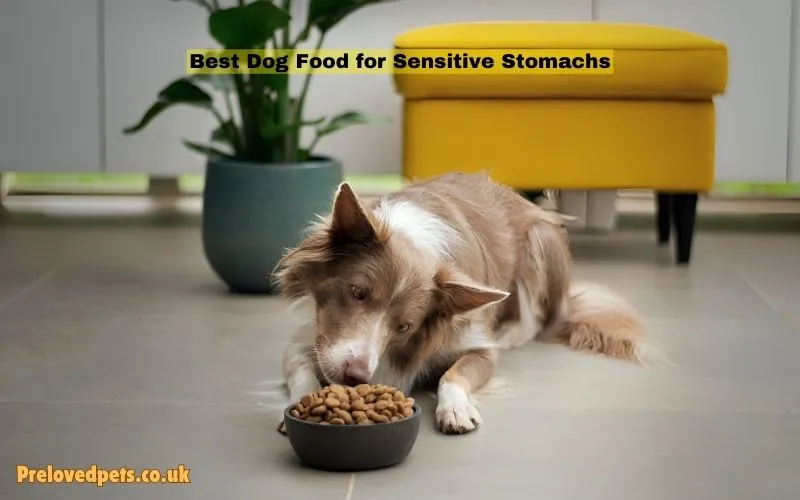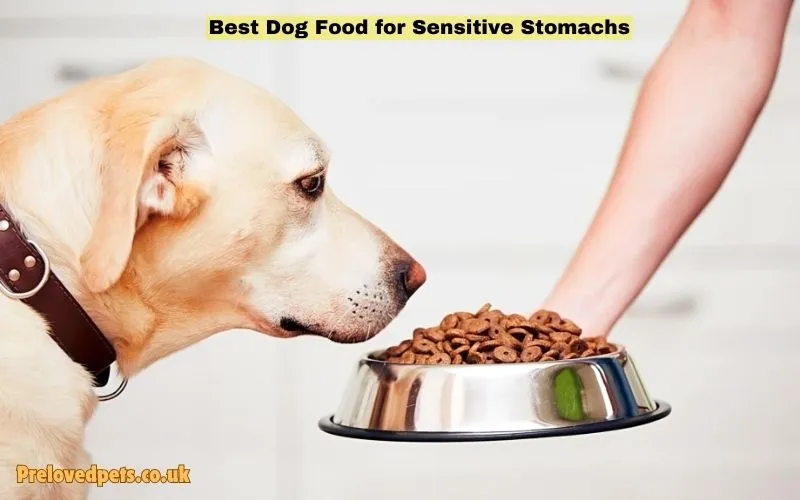Dogs are beloved members of our families, and just like any family member, we want to ensure they are healthy and happy. For many dog owners, dealing with a pet that has a sensitive stomach can be challenging. Finding the right food that provides balanced nutrition without causing digestive issues is crucial. This comprehensive guide will explore the best dog food options for sensitive stomachs, considering various factors such as ingredients, nutritional balance, and specific dietary needs.
Understanding Sensitive Stomachs in Dogs
A sensitive stomach in dogs can manifest in several ways, including vomiting, diarrhea, excessive gas, and a lack of appetite. These symptoms can be caused by a variety of factors, including:
- Food Allergies or Intolerances: Certain ingredients, such as specific proteins, grains, or additives, can trigger allergic reactions or intolerances in dogs.
- Dietary Indiscretion: Eating non-food items or spoiled food can lead to gastrointestinal distress.
- Sudden Dietary Changes: Abrupt changes in a dog’s diet can upset the balance of their gut flora.
- Underlying Health Issues: Conditions such as inflammatory bowel disease (IBD), pancreatitis, or gastrointestinal infections can cause stomach sensitivity.
Key Considerations When Choosing Dog Food for Sensitive Stomachs
When selecting dog food for a pet with a sensitive stomach, consider the following factors:

- High-Quality Ingredients: Look for dog food made with high-quality, easily digestible ingredients. Avoid foods with artificial additives, fillers, and by-products.
- Limited Ingredients: Limited ingredient diets (LID) reduce the number of components that could potentially trigger a reaction.
- Novel Proteins: Proteins that are less commonly used in dog foods, such as duck, venison, or fish, can be beneficial for dogs with protein sensitivities.
- Grain-Free Options: Some dogs have trouble digesting grains. Grain-free diets can be easier on their digestive systems.
- Probiotics and Prebiotics: These support gut health by promoting a healthy balance of intestinal bacteria.
- Omega-3 Fatty Acids: These have anti-inflammatory properties that can help soothe an irritated digestive tract.
Top Dog Food Options for Sensitive Stomachs
1. Hill’s Science Diet Adult Sensitive Stomach & Skin Chicken Recipe
Key Features:
- Primary Protein: Chicken
- Grain: Barley and brown rice
- Additives: Prebiotic fiber for digestive health
- Fatty Acids: Omega-6 for skin and coat health
Hill’s Science Diet is renowned for its science-backed formulations. This recipe focuses on gentle digestion and overall wellness, making it an excellent choice for dogs with sensitive stomachs and skin issues. The inclusion of prebiotic fiber supports a balanced gut microbiome, essential for proper digestion.
2. Purina Pro Plan Sensitive Skin & Stomach Salmon & Rice Formula
Key Features:
- Primary Protein: Salmon
- Grain: Rice and oatmeal
- Additives: Prebiotics and probiotics for digestive health
- Fatty Acids: Omega-3 and Omega-6
Purina Pro Plan’s formula with salmon is designed to be gentle on the stomach while providing complete nutrition. Salmon is a high-quality protein source rich in omega-3 fatty acids, which help reduce inflammation. The addition of prebiotics and probiotics enhances digestive health, making it suitable for dogs with sensitive systems.
3. Blue Buffalo Basics Limited Ingredient Diet Turkey & Potato Recipe
Key Features:
- Primary Protein: Turkey
- Grain-Free: Yes, uses potatoes and peas
- Additives: Pumpkin for digestive support
- Fatty Acids: Omega-3 and Omega-6
Blue Buffalo Basics is a limited ingredient diet that uses turkey as the sole animal protein, making it ideal for dogs with protein sensitivities. The grain-free formula relies on easily digestible carbohydrates like potatoes and peas. Pumpkin is included to aid digestion and soothe the digestive tract.
4. Wellness Simple Limited Ingredient Diet Lamb & Oatmeal Recipe
Key Features:
- Primary Protein: Lamb
- Grain: Oatmeal
- Additives: Prebiotics and probiotics
- Fatty Acids: Omega-3 and Omega-6
Wellness Simple’s limited ingredient diet focuses on minimizing ingredients to reduce the risk of food sensitivities. Lamb is a novel protein for many dogs, and oatmeal is gentle on the stomach. The addition of prebiotics and probiotics supports digestive health, while omega fatty acids promote skin and coat health.
5. Natural Balance L.I.D. Limited Ingredient Diets Sweet Potato & Fish Formula
Key Features:
- Primary Protein: Fish (usually salmon or whitefish)
- Grain-Free: Yes, uses sweet potatoes and peas
- Additives: None
- Fatty Acids: Omega-3 and Omega-6
Natural Balance L.I.D. uses fish as a novel protein source, combined with sweet potatoes, to provide a balanced and gentle diet for sensitive stomachs. This grain-free formula is free from common allergens and focuses on simplicity to avoid digestive issues.
Homemade Dog Food for Sensitive Stomachs
For pet owners who prefer to have complete control over their dog’s diet, preparing homemade meals can be a viable option. Here are some general guidelines for creating homemade dog food for sensitive stomachs:
- Consult a Veterinarian: Always consult with a veterinarian or a pet nutritionist before switching to homemade food to ensure the diet is balanced and meets all nutritional needs.
- Choose Quality Ingredients: Use high-quality, easily digestible proteins (e.g., turkey, lamb, or fish) and carbohydrates (e.g., sweet potatoes, rice, or oats).
- Include Vegetables: Vegetables like carrots, green beans, and pumpkin can provide essential vitamins and fiber.
- Add Supplements: Ensure the diet includes essential vitamins and minerals, which may require supplements.
- Cook Thoroughly: Cook all ingredients thoroughly to make them easier to digest and to eliminate any harmful bacteria.
Sample Recipe: Turkey and Sweet Potato
Ingredients:
- 2 pounds of ground turkey
- 1 cup of cooked sweet potatoes, mashed
- 1/2 cup of carrots, finely chopped
- 1/2 cup of green beans, finely chopped
- 2 cups of cooked brown rice
- 1 tablespoon of fish oil (for omega-3 fatty acids)
Instructions:
- Cook the Ground Turkey: In a large pot, cook the ground turkey over medium heat until fully cooked. Drain any excess fat.
- Add Vegetables: Add the carrots and green beans to the pot and cook until tender.
- Mix in Sweet Potatoes and Rice: Add the mashed sweet potatoes and cooked brown rice to the pot. Stir well to combine.
- Add Fish Oil: Stir in the fish oil to ensure your dog gets a good dose of omega-3 fatty acids.
- Cool and Serve: Allow the mixture to cool before serving. Store any leftovers in the refrigerator for up to three days.
Transitioning to a New Diet
When switching your dog to a new diet, especially one for sensitive stomachs, it’s essential to transition gradually to prevent gastrointestinal upset. Follow these steps for a smooth transition:
- Start Slowly: Begin by mixing a small amount of the new food with your dog’s current food.
- Increase Gradually: Gradually increase the proportion of the new food while decreasing the old food over 7-10 days.
- Monitor for Reactions: Watch for any signs of digestive distress, such as vomiting, diarrhea, or a decrease in appetite. If these occur, slow down the transition process.
Additional Tips for Managing Sensitive Stomachs
- Avoid Table Scraps: Human food can be rich and difficult for dogs to digest. Stick to dog-specific foods and treats.
- Feed Smaller, More Frequent Meals: Smaller, more frequent meals can be easier on your dog’s digestive system.
- Maintain a Consistent Feeding Schedule: Consistency helps regulate your dog’s digestive processes.
- Ensure Fresh Water is Always Available: Hydration is crucial for overall health and aids in digestion.
- Regular Exercise: Exercise helps promote healthy digestion and can alleviate some digestive issues.
When to See a Veterinarian
If your dog continues to have digestive issues despite dietary changes, it’s essential to consult a veterinarian. Chronic vomiting, diarrhea, weight loss, or a lack of appetite can indicate underlying health issues that require medical attention. A veterinarian can perform diagnostic tests to identify any medical conditions and recommend appropriate treatments.
FAQs
What are the common symptoms of a sensitive stomach in dogs?
Common symptoms include vomiting, diarrhea, gas, bloating, and a noticeable decrease in appetite. If you notice any of these signs, consult with your veterinarian.
What ingredients should I look for in dog food for sensitive stomachs?
Look for dog foods with easily digestible ingredients such as chicken, lamb, rice, and potatoes. Foods with added probiotics, prebiotics, and fiber can also help support digestion.
What ingredients should be avoided for dogs with sensitive stomachs?
Avoid dog foods that contain artificial additives, preservatives, high-fat content, and common allergens such as corn, soy, wheat, and dairy products.
Are grain-free diets better for dogs with sensitive stomachs?
Grain-free diets can be beneficial for some dogs with sensitivities, but it depends on the individual dog. Consult with your veterinarian to determine if a grain-free diet is suitable for your pet.
How can I transition my dog to a new food for sensitive stomachs?
Gradually transition your dog to the new food over 7-10 days. Start by mixing a small amount of the new food with their current food, gradually increasing the proportion of the new food while decreasing the old food.
Conclusion
Finding the best dog food for sensitive stomachs requires careful consideration of ingredients, nutritional balance, and your dog’s specific needs. High-quality, limited ingredient diets with novel proteins and easily digestible carbohydrates are often the best choices. Whether you opt for a commercial dog food or a homemade diet, always consult with a veterinarian to ensure your dog receives the proper nutrition.
Managing a dog with a sensitive stomach can be challenging, but with the right food and care, you can help your furry friend lead a healthy and comfortable life. Remember to transition diets gradually, monitor your dog for any adverse reactions, and maintain a consistent feeding routine to support their digestive health.




